“无灵主语”与翻译
- 格式:ppt
- 大小:588.00 KB
- 文档页数:97
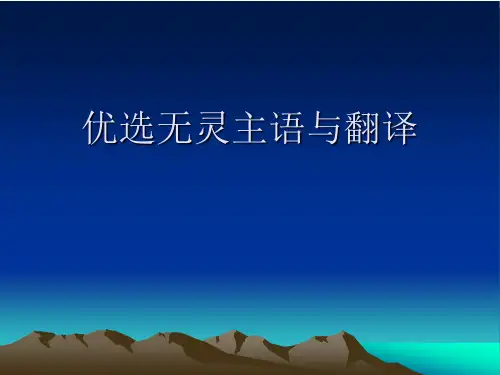
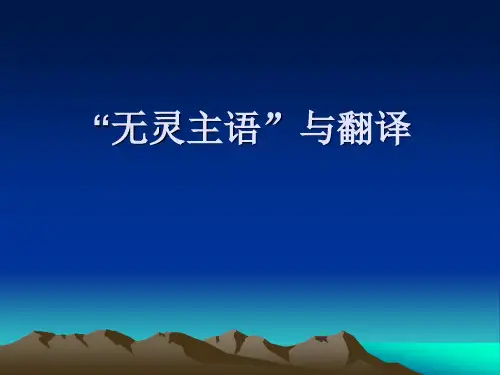
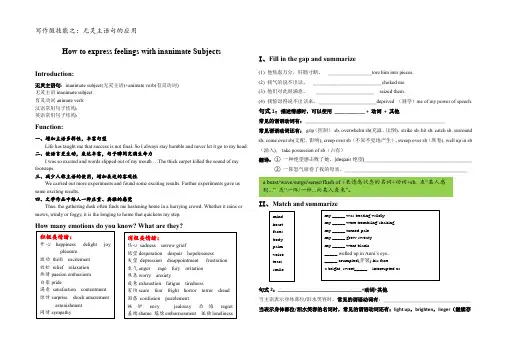
How to express feelings with inanimate SubjectsIntroduction:无灵主语句:inanimate subject(无灵主语)+animate verb(有灵动词)无灵主语inanimate subject:有灵动词animate verb:汉语常用句子结构:英语常用句子结构:Function:一、增加主语多样性,丰富句型Life has taught me that success is not final. So I always stay humble and never let it go to my head.二、使语言更生动,表达丰富,句子瞬间充满生命力I was so excited and words slipped out of my mouth…The thick carpet killed the sound of my footsteps.三、减少人称主语的使用,增加表达的客观性We carried out more experiments and found some exciting results. Further experiments gave us some exciting results.四、文学作品中给人一种庄重、典雅的感觉Thus, the gathering dusk often finds me hastening home in a hurrying crowd. Whether it rains or snows, windy or foggy, it is the longing to home that quickens my step.How many emotions do you know? What are they?I、Fill in the gap and summarize(1) 他焦虑万分,肝肠寸断。
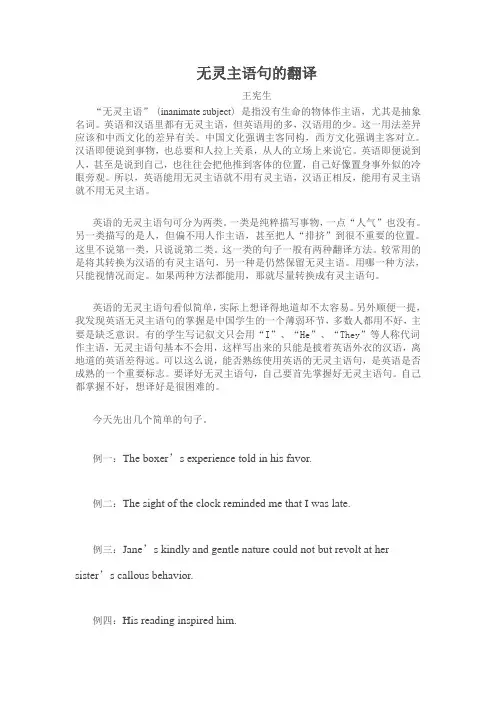
无灵主语句的翻译王宪生“无灵主语” (inanimate subject) 是指没有生命的物体作主语,尤其是抽象名词。
英语和汉语里都有无灵主语,但英语用的多,汉语用的少。
这一用法差异应该和中西文化的差异有关。
中国文化强调主客同构,西方文化强调主客对立。
汉语即便说到事物,也总要和人拉上关系,从人的立场上来说它。
英语即便说到人,甚至是说到自己,也往往会把他推到客体的位置,自己好像置身事外似的冷眼旁观。
所以,英语能用无灵主语就不用有灵主语,汉语正相反,能用有灵主语就不用无灵主语。
英语的无灵主语句可分为两类。
一类是纯粹描写事物,一点“人气”也没有。
另一类描写的是人,但偏不用人作主语,甚至把人“排挤”到很不重要的位置。
这里不说第一类,只说说第二类。
这一类的句子一般有两种翻译方法。
较常用的是将其转换为汉语的有灵主语句,另一种是仍然保留无灵主语。
用哪一种方法,只能视情况而定。
如果两种方法都能用,那就尽量转换成有灵主语句。
英语的无灵主语句看似简单,实际上想译得地道却不太容易。
另外顺便一提,我发现英语无灵主语句的掌握是中国学生的一个薄弱环节,多数人都用不好,主要是缺乏意识。
有的学生写记叙文只会用“I”、“He”、“They”等人称代词作主语,无灵主语句基本不会用,这样写出来的只能是披着英语外衣的汉语,离地道的英语差得远。
可以这么说,能否熟练使用英语的无灵主语句,是英语是否成熟的一个重要标志。
要译好无灵主语句,自己要首先掌握好无灵主语句。
自己都掌握不好,想译好是很困难的。
今天先出几个简单的句子。
例一:The boxer’s experience told in his favor.例二:The sight of the clock reminded me that I was late.例三:Jane’s kindly and gentle nature could not but revolt at her sister’s callous behavior.例四:His reading inspired him.例五:Fortune smiled on him.例六:Aimlessness and failure marked Hitler’s early life.例七:Childhood dearly loves a tale; for its simple heart finds the way out of a reality it does not understand by contriving a world of make-believe.A Research on the International Competitive Power of Transportation Service Exports from Guangdong ProvinceAbstract: Guangdong, as the largest import and export trading power in China, has seen further expansion in international trade in the 21st century, especially after China became a member country of WTO. Since the 90's of the last century, with the rapid development of information technology, transportation service exports has been flourishing globally. Guangdong, being one of the forerunners in Chinese economic reform, shows the state of affairs in the field of international transportation exports.Based on the analysis of development status of transportation service exports from Guangdong, of the necessity of tapping into transportation service exports, of the international competitive power and competitive edge of Guangdong in the field of transportation service exports, I putforward the strategy of improving the international competitive power of Guangdong in transportation service exports.Keywords: Guangdong Province, transportation service, service exports, international competitive power。
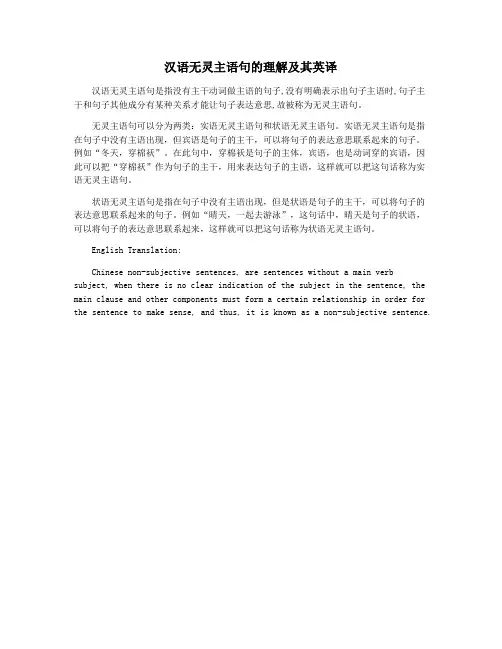
汉语无灵主语句的理解及其英译
汉语无灵主语句是指没有主干动词做主语的句子,没有明确表示出句子主语时,句子主干和句子其他成分有某种关系才能让句子表达意思,故被称为无灵主语句。
无灵主语句可以分为两类:实语无灵主语句和状语无灵主语句。
实语无灵主语句是指在句子中没有主语出现,但宾语是句子的主干,可以将句子的表达意思联系起来的句子。
例如“冬天,穿棉袄”。
在此句中,穿棉袄是句子的主体,宾语,也是动词穿的宾语,因此可以把“穿棉袄”作为句子的主干,用来表达句子的主语,这样就可以把这句话称为实语无灵主语句。
状语无灵主语句是指在句子中没有主语出现,但是状语是句子的主干,可以将句子的表达意思联系起来的句子。
例如“晴天,一起去游泳”,这句话中,晴天是句子的状语,可以将句子的表达意思联系起来,这样就可以把这句话称为状语无灵主语句。
English Translation:
Chinese non-subjective sentences, are sentences without a main verb subject, when there is no clear indication of the subject in the sentence, the main clause and other components must form a certain relationship in order for the sentence to make sense, and thus, it is known as a non-subjective sentence.。

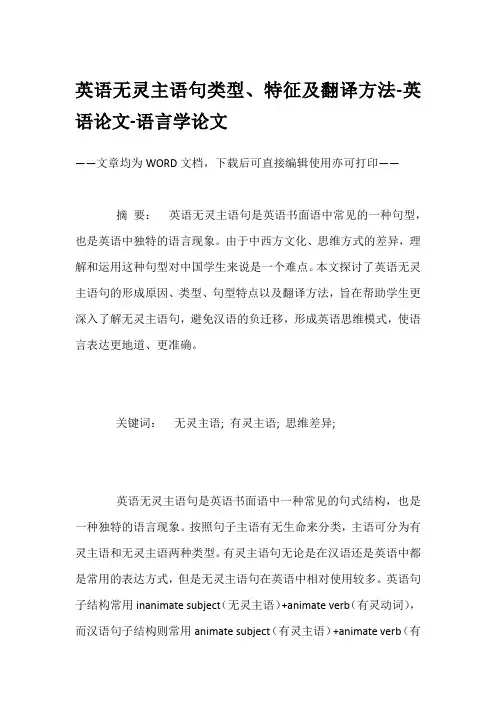
英语无灵主语句类型、特征及翻译方法-英语论文-语言学论文——文章均为WORD文档,下载后可直接编辑使用亦可打印——摘要:英语无灵主语句是英语书面语中常见的一种句型,也是英语中独特的语言现象。
由于中西方文化、思维方式的差异,理解和运用这种句型对中国学生来说是一个难点。
本文探讨了英语无灵主语句的形成原因、类型、句型特点以及翻译方法,旨在帮助学生更深入了解无灵主语句,避免汉语的负迁移,形成英语思维模式,使语言表达更地道、更准确。
关键词:无灵主语; 有灵主语; 思维差异;英语无灵主语句是英语书面语中一种常见的句式结构,也是一种独特的语言现象。
按照句子主语有无生命来分类,主语可分为有灵主语和无灵主语两种类型。
有灵主语句无论是在汉语还是英语中都是常用的表达方式,但是无灵主语句在英语中相对使用较多。
英语句子结构常用inanimate subject(无灵主语)+animate verb(有灵动词),而汉语句子结构则常用animate subject(有灵主语)+animate verb(有灵动词)。
英语无灵主语句的使用不仅可以准确地表达思想和观念,也能够反映出对语言的熟练掌握。
但是这种句型经常会给中国学生带来理解和运用的困难,有必要对其进行分析和研究,使学生英语水平提高,语言表达更地道、更准确。
一、形成原因语言是思维和文化的载体,思维和文化的差异也能通过语言表达体现出来。
汉语句式多是有灵主语,体现了以人为中心的思维方式;英语句式多是无灵主语,体现了客观判断,逻辑性和准确性。
不同的哲学思想对人们的思维方式产生了很大的影响。
中国传统思想把主体自身作为宇宙中心,认为认识了自身就认识了自然界和宇宙的根本规律,用主体的修养代替对客体的认识,主客一体。
这种主体性思维方式往往从自我出发来理解、解释,描写客观世界中的事物。
西方思维传统以自然为认知对象,强调客观性,认为只有认识自然才能把握自然,只有探索自然才能征服自然,因此主体客体二分,将自然作为自身之外的对象来研究。
![什么是无灵主语[整理版]](https://uimg.taocdn.com/f1a7616ac77da26924c5b030.webp)
什么是无灵主语[整理版]什么是无灵主语,无灵主语的概念极为简单:有无生命的事物做主语来展开句子。
其实它向我们传达的只是一种思维,一种思考的方式而已。
什么是无灵主语, Eg: I love everbody.译为:我爱大家。
如果出现在口语中,这样的表达当然最为清晰,但如果出现在写作中,如下表达可能更为生动一些:My love goes to everbody.从例子可以看出,用客观的事物love代替有生命的I,这就是无灵主语的实质。
但我们为什么要使用无灵主语,它究竟有什么优点呢, (1)增加主语的多样性。
往往在写作时,我们会反复用同一有生命的词作主语,使语句显得单调,重复。
这些总在不经意之间常常发生。
Eg: We don’t think so.If we want light,we must conquer darkness. 三个we的使用,使句子显得平淡,甚至别扭,但如果稍加变动,句子会显得协调的多。
? We don’t think so.If we want light,darkness must be conquered. ? This idea can’t acquire our ac ceptance,If we want light,we must conquer darkness. (2)使语言更生动化。
将无生命的事物作主语而展开的句子,往往会用上比喻、拟人等修辞手法,语言随之提升一个档次。
Eg: 青少年常常沉迷于网络。
Indulge(sb) in, be addicted in; Be absorbed in; pay attentionto;concentrate on.Internet is Pandora’s Box for youth. 这也就是无灵主语的难点所在,也是华丽之处:并不是简单的主动语态变为被动语态,而是用主动语态去表达被动意义。
Eg: People accepted the fact.人们接受这个事实。
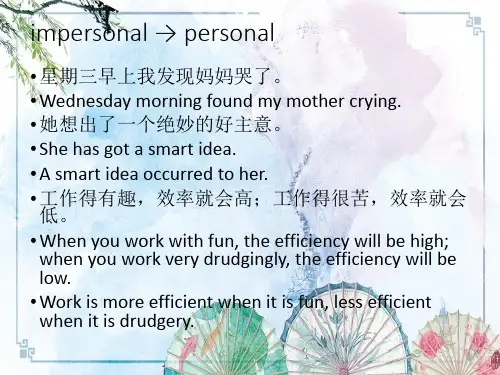

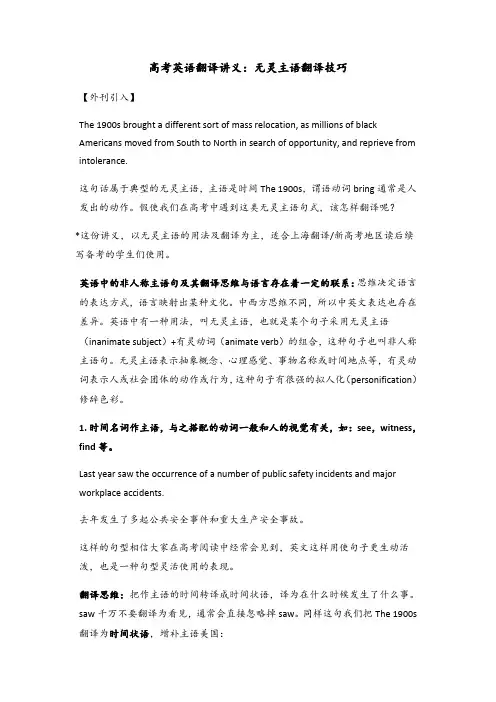
高考英语翻译讲义:无灵主语翻译技巧【外刊引入】The 1900s brought a different sort of mass relocation, as millions of black Americans moved from South to North in search of opportunity, and reprieve from intolerance.这句话属于典型的无灵主语,主语是时间The 1900s,谓语动词bring通常是人发出的动作。
假使我们在高考中遇到这类无灵主语句式,该怎样翻译呢?*这份讲义,以无灵主语的用法及翻译为主,适合上海翻译/新高考地区读后续写备考的学生们使用。
英语中的非人称主语句及其翻译思维与语言存在着一定的联系:思维决定语言的表达方式,语言映射出某种文化。
中西方思维不同,所以中英文表达也存在差异。
英语中有一种用法,叫无灵主语,也就是某个句子采用无灵主语(inanimate subject)+有灵动词(animate verb)的组合,这种句子也叫非人称主语句。
无灵主语表示抽象概念、心理感觉、事物名称或时间地点等,有灵动词表示人或社会团体的动作或行为,这种句子有很强的拟人化(personification)修辞色彩。
1. 时间名词作主语,与之搭配的动词一般和人的视觉有关,如:see,witness,find等。
Last year saw the occurrence of a number of public safety incidents and major workplace accidents.去年发生了多起公共安全事件和重大生产安全事故。
这样的句型相信大家在高考阅读中经常会见到,英文这样用使句子更生动活泼,也是一种句型灵活使用的表现。
翻译思维:把作主语的时间转译成时间状语,译为在什么时候发生了什么事。
saw千万不要翻译为看见,通常会直接忽略掉saw。
英语里主语常用人称和非人称两种形式来表达。
用非人称主语表达时,往往注重“什么事发生在什么人身上”。
而汉语则较常用人称主语表达,侧重“什么人怎么样了”。
如1. A terrible thought suddenly struck me—had I locked the door?我突然产生了一个可怕的想法——我锁门了吗?例2.A strange peace came over her when she was alone.她独处时感到一种特别的安宁。
英语中非人称作主语的句子主要有两种类型:a非人称主语句采用“无灵主语”(inanimate subject),表示抽象概念、心理感觉、事物名称或时间地点等,但谓语却常常使用“有灵动词”(animate verb)表示人或社会团体的动作和行为,如:see,desert,find,bring,witness,give,escape,surround,kill,deprive,serve,send,know,tell,permit,invite,take,drive,prevent…from等,这类句子往往带有拟人化(personification)的修辞色彩(如上面两个例句)。
b用非人称代词“it”作主语例如:It never occurred to me that she was so dishonest.译文:我从没有想到她会这样的不诚实。
英语中的这类句子具备着含蓄幽默、生动活泼、客观公正、简洁凝练、句型多样等特点,所以使用广泛。
但是由于汉、英两种语言属于不同的语系,所以在翻译这种无灵主语句时,要考虑到英语的思维方法,然后转换为汉语的思维方法,把句子的内在意义用汉语表达出来。
下面就将非人称(impersonal)主语句英译汉的基本方法略作探讨。
1. 如果主语暗含着条件、因果、时间、地点、方式等意义时,用人作主语,把原来的主语翻译成各种形式的状语。
例如:The forty years, 1840-1880, brought almost ten million migrants to America.译文:从1840至1880这四十年中,近一千万移民移居美国。
英语无灵主语讲义什么是无灵主语?无灵主语的概念极为简单:有无生命的事物做主语来展开句子。
其实它向我们传达的只是一种思维,一种思考的方式而已。
什么是无灵主语?Eg: I love everbody.译为:我爱大家。
如果出现在口语中,这样的表达当然最为清晰,但如果出现在写作中,如下表达可能更为生动一些:My love goes to everbody.从例子可以看出,用客观的事物love代替有生命的I,这就是无灵主语的实质。
但我们为什么要使用无灵主语,它究竟有什么优点呢?(1)增加主语的多样性。
往往在写作时,我们会反复用同一有生命的词作主语,使语句显得单调,重复。
这些总在不经意之间常常发生。
Eg: We don’t think so.If we want light,we must conquer darkness.三个we的使用,使句子显得平淡,甚至别扭,但如果稍加变动,句子会显得协调的多。
①We don’t think so.If we w ant light,darkness must be conquered.②This idea can’t acquire our acceptanc e,If we want light,we must conquer darkness.(2)使语言更生动化。
将无生命的事物作主语而展开的句子,往往会用上比喻、拟人等修辞手法,语言随之提升一个档次。
Eg: 青少年常常沉迷于网络。
Indulge(sb) in, be addicted in; Be absorbed in; pay attention to;concentrate on.Internet is Pandora’s Box for youth.这也就是无灵主语的难点所在,也是华丽之处:并不是简单的主动语态变为被动语态,而是用主动语态去表达被动意义。
Eg: People accepted the fact.人们接受这个事实。
无灵主语:转变一个思维,英文表达更地道无灵主语是英文中非常重要的语法结构,但更是一种表达习惯和思维模式。
什么是无灵主语无灵主语这个概念听起来有点玄妙,但说起来却是很好理解,就是以无生命的事物作为主语,来展开句子。
给大家举个例子。
下面这句话:I lost the courage我失去了勇气如果将courage作为主语,改为:courage deserted me勇气弃我而去就是无灵主语,英文中叫做inanimate subject。
这里“无生命的事物”所指比较广泛,抽象概念、心理感受、事物的名称、时间、地点等等,都包括其中。
无灵主语还有一个特点,就是它的谓语动词往往是“有灵动词”,也就是有生命的事物的动作和行为,比如witness(见证)、greet(迎接)、escape(逃走)、motivate(鼓励)、wait(等待)、tell(告诉)等等。
举例来说:a nervous laugh escapes my throat我不由自主紧张地笑了一声The strike killed two militants and wounded two others这次袭击导致两名激进分子死亡,另两人受伤。
句子中laugh(笑)和strike(袭击)是无灵主语,而escape(逃走),kill(杀死),wound(使受伤)则是有灵动词。
无灵主语与中文表达习惯不符无灵主语并不是什么难掌握的语法点,不过中国学生很少在写作中运用,主要是由于这种表达方式不符合中文习惯。
汉语多用人称做主语,侧重表达“人做事”英语则常用非人称做主语,侧重表达“事对人的作用影响”所以在汉语中,“有灵动词”与“无灵动词”有明显区别:看、听、说、来、离开、邀请、剥夺等等是有灵动词,一般只与有灵主语搭配。
出现、发生、存在、变、吸引、上升是无灵动词,多表示出现消失、存在与变化,一般只有它们才可以和无灵主语搭配。
这样的区别,在英文却中常常是模糊的。
英文中无灵主语和有灵动词搭配,是很常见的表达方式。